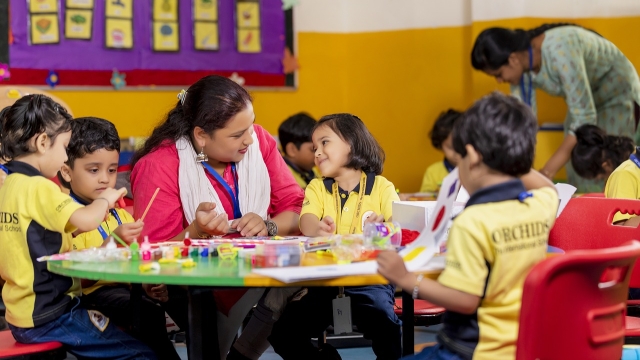
Kindergarten is a magical place where the world of imagination meets the thrill of discovery. It is a vibrant environment filled with laughter, creativity, and the unbridled curiosity of young minds. Here, children embark on their first educational journey, unlocking new skills and exploring the wonders around them. Every day in kindergarten is an adventure, as teachers guide their students through a landscape of colorful stories, engaging activities, and the joys of social interaction.
As children gather in their bright classrooms, you can feel the energy in the air. They play, create, and learn together, forming friendships that often last a lifetime. From painting masterpieces to building elaborate block towers, each activity fosters their development, allowing them to express themselves freely. Kindergarten is not just about learning the basics; it is about nurturing the imaginations of young learners and encouraging them to take flight into a world full of possibilities.
The Importance of Play
Play is an essential part of childhood development, especially in kindergarten. During these formative years, children learn through exploration and interaction with their environment and peers. Engaging in play allows them to express their emotions, develop social skills, and build relationships. As they navigate various play scenarios, children learn to cooperate, negotiate, and resolve conflicts, all of which are critical skills for their future.
Moreover, play fosters creativity and imagination. In kindergarten, children are encouraged to engage in role-playing, storytelling, and art activities that stimulate their creative thinking. This imaginative play not only enhances cognitive abilities but also provides them with opportunities to experiment with different roles and perspectives. Such experiences are fundamental in helping them understand the world around them and develop a sense of identity.
Lastly, play contributes significantly to physical development. Through active play, children enhance their motor skills, coordination, and overall health. Whether running, jumping, or climbing, these activities promote physical strength and endurance. Structured and unstructured playtime in kindergarten creates a balanced approach to learning, allowing children to thrive both mentally and physically as they prepare for the next stages of their education.
Nurturing Creativity
In kindergarten, creativity is a vital aspect of development. Children are naturally curious and imaginative, and nurturing this creativity allows them to explore their thoughts and ideas freely. The use of art, music, and storytelling in the classroom provides an avenue for self-expression. Through hands-on activities like painting and crafting, young learners can discover new ways to communicate their feelings and understand the world around them.
Play is another important component of fostering creativity in kindergarten. When children engage in pretend play, they are not just having fun; they are also developing problem-solving skills and social interactions. These imaginative scenarios give them the opportunity to step into different roles and think outside the box. Educators can enhance this experience by providing a variety of props and open-ended materials that inspire children to create their own narratives.
Furthermore, encouraging collaboration among peers supports creative growth. Group projects and shared activities allow young children to brainstorm ideas together, leading to greater creativity. As they exchange thoughts and build on one another’s suggestions, they learn the value of teamwork and the power of diverse perspectives. This collaborative environment not only enhances their creative skills but also strengthens their ability to communicate and work with others effectively.
Building Social Skills
In kindergarten, children embark on a journey that extends beyond learning letters and numbers; they begin to discover the foundations of social interaction. This early education stage is crucial for teaching children how to communicate with their peers effectively. Through group activities and playtime, kids learn the art of conversation, taking turns, and sharing with others. These experiences not only boost their confidence but also help mold their character as they navigate the complexities of friendships.
Another significant aspect of building social skills in kindergarten is the encouragement of empathy and understanding. Teachers often facilitate activities that require children to express their feelings and recognize the emotions of their classmates. By engaging in role-play or storytelling, children learn to see the world from different perspectives. This practice fosters a sense of community in the classroom, allowing kids to form meaningful connections and understand the value of cooperation and kindness.
As children progress through the kindergarten experience, they also encounter various social scenarios that challenge them to resolve conflicts and negotiate with others. These teachable moments, whether they arise during play or group projects, provide invaluable lessons in problem-solving. Learning to handle disagreements respectfully equips children with essential tools that will serve them well beyond the classroom, nurturing responsible and considerate individuals who can thrive in diverse environments.
Encouraging Curiosity
Curiosity is a natural trait in young children, and kindergarten is the perfect environment to nurture it. Teachers can stimulate inquisitive minds by creating a rich and engaging learning space filled with interesting materials and resources. By providing opportunities for exploration through hands-on activities, children can discover new concepts and ideas at their own pace. Encouraging questions and allowing students the freedom to seek answers fosters a sense of ownership in their learning process.
Join Now
Incorporating themes and topics of interest into the curriculum can boost enthusiasm for learning. When educators tap into what captivates their students, they can tailor lessons that resonate more deeply. For instance, if children show excitement about animals, lessons on nature can include interactive games, stories, and art projects that bring that theme to life. This approach not only enhances their understanding but also ignites a passion for learning that can last a lifetime.
Creating a supportive atmosphere is vital for encouraging curiosity in kindergarten. By celebrating all questions and providing a safe space for exploration without fear of judgment, children will feel more confident in expressing their thoughts. Teachers can model curiosity themselves by showing enthusiasm for learning and demonstrating how to ask questions. This positive reinforcement will help children understand that curiosity is a valuable trait, paving the way for a lifelong love of knowledge and exploration.
The Role of Teachers
Teachers play a crucial role in the kindergarten experience, serving as guides and facilitators in a child’s early education. Their responsibilities extend far beyond simply delivering lessons; they create a supportive and nurturing environment where young learners feel safe to explore and express themselves. By incorporating play-based learning and hands-on activities, teachers encourage creativity and critical thinking, helping children to develop a love for learning from an early age.
In addition to fostering academic growth, kindergarten teachers also focus on social and emotional development. They teach important skills such as sharing, cooperation, and empathy, which are essential for building healthy relationships with peers. By modeling positive behavior and providing guidance in social interactions, teachers help children navigate the complexities of their first group experiences. This holistic approach ensures that every child is well-prepared for future educational challenges.
Moreover, teachers in kindergarten act as communicators between parents and the school. They provide valuable insights into a child’s progress and well-being, fostering a partnership that supports the child’s development. Through regular updates, meetings, and workshops, teachers empower parents to be active participants in their child’s education journey. This collaboration between educators and families creates a strong foundation for lifelong learning, reinforcing the idea that education is a shared responsibility.



